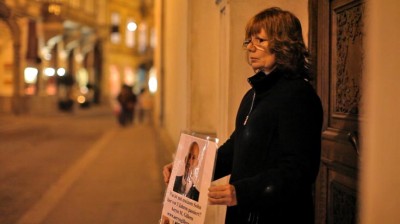| Reviews & Columns |
|
Reviews DVD TV on DVD Blu-ray 4K UHD International DVDs In Theaters Reviews by Studio Video Games Features Collector Series DVDs Easter Egg Database Interviews DVD Talk Radio Feature Articles Columns Anime Talk DVD Savant Horror DVDs The M.O.D. Squad Art House HD Talk Silent DVD
|
DVD Talk Forum |
|
|
| Resources |
|
DVD Price Search Customer Service #'s RCE Info Links |
|
Columns
|
|
|
Gone

Reviewed at the 2011 Tribeca Film Festival
The facts are these: Aeryn Gillern flew back to Cortland, New York for ten days in September 2007. He then flew to Vienna, which he'd made his new home; his mother, Kathy, planned to follow shortly thereafter for an extended visit. They spoke on the phone for the last time on October 27. Four days later, his employers called Kathy to tell her that Aeryn hadn't shown up for work for the last two days. No one ever saw him again.
Gretchen and John Morning's Gone tells the story of how Kathy Gillern went to Vienna to try to find out what happened to her son, and what she encountered there. It is not a comprehensive documentary, not in any traditional sense; the filmmakers do not do much of their own investigating, and do not seek out multiple sources. There is, in fact, only one interview subject: Kathy, a retired cop who is absolutely wrecked by her son's disappearance, and confounded by the local authorities' apathy towards the investigation. It is not a muckraking piece of journalism; it is her story. That is enough.
The picture's methodology is disarmingly simple; the Mornings interview Kathy, in front of a black background, as she recalls the events of her visits, the places she went and people she met in an attempt not only to reconstruct her son's disappearance, but to determine that the ever-shifting "official version" of what happened to Aeryn was quite simply impossible. As she describes her journey, the filmmakers intercut her own home video from her visits, the policewoman relentlessly documenting her investigation.
She takes on that job fairly early, once she realizes that the local cops are inefficient, and--later--combative and downright hostile. Aeryn was openly gay--even a competitor in the Mr. Gay Austria contest two years running. The police claim that Aeryn was deeply unhappy (as all gay men are, y'know) and committed "spontaneous suicide." There is nothing to support this thesis. "He is just a gay man," Kathy shrugs, "and he's not an Austrian, and they just don't care."
She is a good storyteller. Her frustration, her rage, her heartbreak are clearly and intensely conveyed--her eyes burn when she recalls how she was treated by the police, her voice breaks when she talks about her visit to the last place that he was seen alive. The film's emotional high point is a vivid and heart-wrenching description of the day she spent packing up his apartment, where "he'd made a home"; "that's what hurt the most," she explains, between the tears, "because that's all I had left of him."
It's easy to play up the emotion of the story, to make it sound like more of a sobfest than it is--but Kathy is tough, and dedicated, and unswayable. She's determined, and she's certainly not going to give up on account of a police department that is clearly corrupt or incompetent (or, more likely, both). The Mornings piece the picture together compellingly, using the repetition of visuals and locations, along with the mood of the ambient music and sound design, to craft a film that is hypnotic and riveting--the cinematic equivalent to a page-turner, in which the only real regret (on and off screen) is the loose ending.
The bulk of the film, as mentioned, is Kathy's interviews and her video, with some establishing shots and POV re-enactments by the filmmakers. Towards the end, they use a video Aeryn shot himself, narrating a little tour of his apartment. It's a little startling, to finally hear his voice--by that point, he's almost become an abstract idea. But that's why Kathy kept going back to Vienna; he was never just an abstract, just a "missing person," just another unhappy gay man. He was a person. He was her son. She never stopped hearing that voice.
Jason lives in New York. He holds an MA in Cultural Reporting and Criticism from NYU.
|
| Popular Reviews |
| Sponsored Links |
|
|
| Sponsored Links |
|
|
| Release List | Reviews | Shop | Newsletter | Forum | DVD Giveaways | Blu-Ray | Advertise |
|
Copyright 2024 DVDTalk.com All Rights Reserved. Legal Info, Privacy Policy, Terms of Use,
Manage Preferences,
Your Privacy Choices | |||||||











